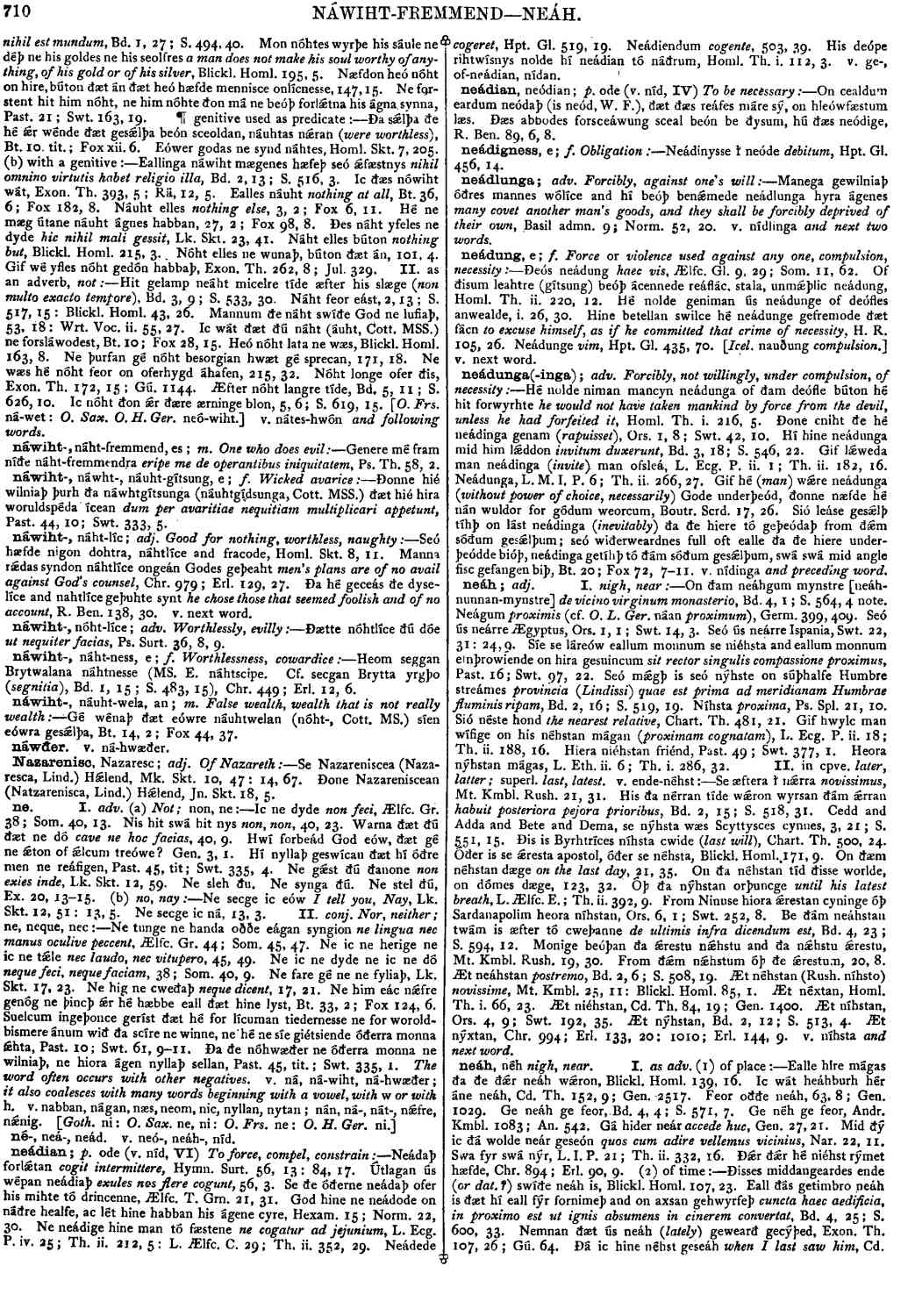neáh
- adjective
- adverb
-
Ealle hire mágas ða ðe ðǽr neáh wǽron,
- Blickl. Homl. 139, 16.
-
Ic wát heáhburh hér áne neáh,
- Cd. Th. 152, 9 ;
- Gen. 2517.
-
Fear oððe neáh,
- 63, 8 ;
- Gen. 1029.
-
Ge neáh ge feor,
- Bd. 4, 4 ;
- S. 571, 7.
-
Ge néh ge feor,
- Andr. Kmbl. 1083 ;
- An. 542.
-
Gá hider neár
accede huc,
- Gen. 27, 21.
-
Mid ðý ic ðá wolde neár geseón
quos cum adire vellemus vicinius,
- Nar. 22, 11.
-
Swa fyr swá nýr,
- L. I. P. 21 ;
- Th. ii. 332, 16.
-
Ðǽr ðǽr hé niéhst rýmet hæfde,
- Chr. 894 ;
- Erl. 90, 9.
-
Ðisses middangeardes ende (
or dat. ?
)swíðe neáh is,
- Blickl. Homl. 107, 23.
-
Eall ðás getimbro neáh is ðæt hí eall fýr fornimeþ and on axsan gehwyrfeþ
cuncta haec aedificia, in proximo est ut ignis absumens in cinerem convertat,
- Bd. 4, 25 ;
- S. 600, 33.
-
Nemnan ðæt ús neáh (
lately
)gewearð gecýþed,
- Exon. Th. 107, 26 ;
- Gú. 64.
-
Ðá ic hine néhst geseáh
when I last saw him,
- Cd.Th. 34, 12 ;
- Gen. 536.
-
Ðonan hý God nýhst eágum ségun,
- Exon. Th. 34. 1 ;
- Cri: 535.
-
Heó hafaþ leáf neáh swylce mistel,
- Lchdm. i. 254, 12.
-
Ða Finnas and ða Beormas sprǽcon neáh án geþeóde,
- Ors. 1, 1 ;
- Swt. 17, 34.
-
Hié æt níhstan hæfdon ealra ðara anwald ðe ǽr néh heora hæfdon
in the end they had dominion over all those who before nearly had dominion over them,
- 4, 9 ;
- Swt. 192, 35.
-
Swá neáh wæs þúsend áurnen
so nearly had a thousand years passed (all but twenty-seven),
- Chr. 973 ;
- Erl. 124, 23.
-
Swíðe neáh ðú ongeáte ðæt riht,
- Bt. 34, 12 ;
- Fox 154, 10.
-
Nihtscúwan neáh ne mihton (
could not nearly
)heolstor áhýdan,
- Col. Th. 184, 29 ;
- Exod. 114.
-
Hí ne notigaþ náwér neáh feórþan dǽles ðisse eorþan
they do not use anywhere near a fourth part of the earth,
- 18, 1 ;
- Fox 62, 9.
-
Ðæt gé dón ne mágon, ne furþum náwér neáh,
- 18, 2 ;
- Fox 64, 6 : Shrn. 196, 28 : 197, 13.
-
Ne maeg hió ðeáh gescínan áhwǽrgen neáh ealla gesceafta
the sun cannot reach with its rays anywhere near all creatures,
- Met. 30, 10.
-
Ús is þearf ðæt wé geþencen hwæt Dauid cwæþ and eác ðon dón swá wé nýhst mǽgan
we must consider what David said, and besides that act as nearly as we can accordingly,
- L. E. I. 30 ;
- Th. ii. 426, 38.
-
Neáh helle
secus infernum,
- Ps. Spl. 140, 9.
-
Neáh [Lind. Rush. néh] ðam túne
juxta praedium,
- Jn. Skt. 4, 5.
-
Seó flóweþ neáh ðære ceastre wealle,
- Bd. 1, 7 ;
- S. 478, 5.
-
Him wæs engel neáh,
- Exon. Th. 112, 14 ;
- Gú. 143.
-
Ðæt nán ne sǽte hiere x mílum neáh
that no one should settle within ten miles of it (Carthage),
- Ors. 4, 13 ;
- Swt. 210, 22.
-
Tó ðæm túne néh Oliuetes dúne,
- Blickl. Homl. 69, 33.
-
Gang mé neár hider
come hither nearer to me,
- 179, 30.
-
Seó Ægyptus ðe ús neár is,
- Ors. 1, 1 ;
- Swt. 12, 16.
-
Swá hé biþ ðære sunnan neár swá biþ hire fyrr
whether it (the moon) is nearer to the sun or farther from it,
- Shrn. 64, 32.
-
Swá neár ende ðyssere worulde swá máre ehtnys ðæs deófles
the nearer to the end of the world, the greater the devil's persecution,
- Homl. Th. ii. 370, 15.
-
Ne biþ hió merestreáme ðé neár ðe on midne dæg,
- Met. 28, 37.
-
Ðá se swég mé nýr wæs,
- Bd. 5, 12 ;
- S. 628, 31.
-
Swá swá sió nafu férþ néhst (Cott. MS. neáhst) ðære eaxe,
- Bt. 39, 7 ;
- Fox 222, 1.
-
Sceall beón se læsta dǽl nýhst ðæm túne,
- Ors. 1, 1 ;
- Swt. 20, 33.
-
Ne ðínre forþfóre swá neáh is
neque mori adhuc habes,
- Bd. 4, 24 ;
- S. 598, 37, 32 : 3, 8 ;
- S. 531, 36.
-
Ðære týde is neáh, ðæt Godes cyrce hafaþ sybbe on eorþan,
- Shrn. 154, 33.
-
Biþ néh ðæm seofoþan dæge,
- Blickl. Homl. 95, 11.
-
Hié wéndon ðæt hit neár worulde endunge wǽre ðonne hit wǽre,
- Past. 32 ;
- Swt. 213, 6.
-
Ic dó neáh ðam ðe ðú cwǽde
juxta verbum tuum faciam,
- Ex. 8, 10.
-
Neáh (
juxta
)eallon ðám þingum, ðe Drihten bebeád,
- Num. 1, 54: 8, 20.
-
Neáh andefene
prope modum,
- Wrt. Voc. ii. 66, 73.
-
Ágnung biþ nér ðam ðe hæfþ ðonne ðam ðe æfter sprecþ
possession is nine points of the law,
- L. Eth. ii. 9 ;
- Th. i. 290, 20.
-
Ús sylfe gerihtlǽcan swá neáh swá wé nýhst mágon ðam rihte
to direct ourselves as much according to right as we possibly can,
- Chart. Th. 615, 24.
Bosworth, Joseph. “neáh.” In An Anglo-Saxon Dictionary Online, edited by Thomas Northcote Toller, Christ Sean, and Ondřej Tichy. Prague: Faculty of Arts, Charles University, 2014. https://bosworthtoller.com/23467.
Checked: 1